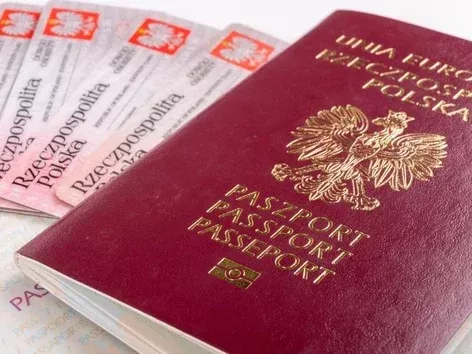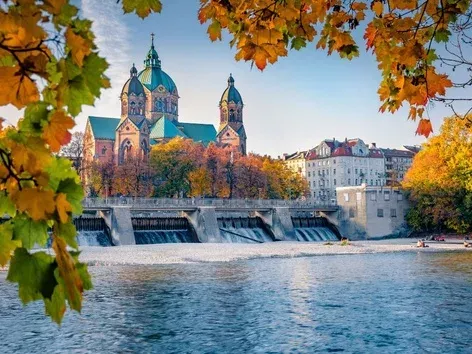Work permit in Poland: a detailed guide
Table of contents
- What documents do foreigners need to work in Poland?
- Citizens of which countries do not need a work permit in Poland?
- How long does it take to get a work permit in Poland?
- Types of work visas in Poland
- How to apply for a visa to Poland?
- List of documents for obtaining a Polish work visa
- Types of work permits in Poland
- How to issue a work permit in Poland?
- List of documents for obtaining a work permit in Poland
- How to extend a work permit in Poland?
- What are the limitations of a Polish work permit?
- Moving to Poland with the family

When planning to work in the Republic of Poland, it is important to make sure that you have a work permit. In addition, you need to know the answers to important questions about employment in the country. Find out more about what documents a foreigner needs to work in Poland, how long it takes to obtain a work permit, how to apply for a visa to Poland and other details
Poland's economy is actively developing, which is why many foreigners are increasingly considering the possibility of employment in the country. Moving to this European country can offer many advantages to an expat, such as a low cost of living, access to high-quality healthcare, living in an economically stable country, and career prospects. Workers are guaranteed to earn twice as much in Poland than in many other countries of the world.
Read details about the advantages and disadvantages of working in Poland at the link.
For legal employment in Poland, foreigners must have an appropriate permit. Working without the necessary documents is illegal and can result in severe punishment, including a fine, a ban on working in Poland, deportation and even imprisonment.
How to get a work permit in Poland? A detailed guide for expats follows.
What documents do foreigners need to work in Poland?
Foreigners moving to Poland must obtain a visa, which is the basis for living in the country, and a work permit - for legal employment.
There are different types of work visas and permits.
1. The most common permissions are:
- Type A work permit – used for standard employment contracts, when employed by employers who have a representative office in Poland.
- Type C work permit – intended for employees hired by a foreign employer to work in Poland.
2. The most popular work visas include: short-term (Schengen type C) or long-term (Schengen type D).
After the expiration of the validity period of the permit documents, expats must either extend them or return to their homeland.
Citizens of which countries do not need a work permit in Poland?
Since Poland is part of the European Union, citizens of EU countries, as well as Switzerland, Norway and Great Britain, can work in Poland without special permits.
In addition, citizens of Armenia, Belarus, Georgia, Moldova and Ukraine do not need to apply for a work permit if they intend to work in Poland for no longer than 6 months a year as a seasonal worker. The following can also work without a work permit:
- Husband or wife of a Polish citizen.
- Foreigners who have obtained temporary protection or refugee status in Poland.
- Persons who have a long-term EU resident's residence permit issued by the Polish authorities.
- Foreigners who received a residence permit for humanitarian reasons.
- Persons who have issued a temporary residence permit in Poland for the purpose of family reunification or for study.
- Trainers who are undergoing professional training, perform advisory roles or work within the framework of European Union programs or other international programs.
- Teachers of foreign languages.
- Media representatives.
- Performers (maximum 30 days in a calendar year).
- Long-term residents of the EU are people who are not citizens of the EU, but have lived in the region legally for at least five years.
- Full-time students studying in Poland, including doctoral students.
The rest of the expats must issue a work permit and a work visa for employment in Poland.
How long does it take to get a work permit in Poland?
The processing time for a visa or permit application depends on its type, but is usually between 6 and 12 weeks.
Types of work visas in Poland
Polish migration legislation provides for several types of visas, the most common are:
- Type C – allows its holder to stay in the territory of all countries of the Schengen Agreement, including Poland, for a maximum of 90 days in a 180-day period.
- Type D – national visa type D allows you to enter and stay in Poland from 90 days to one year, as well as travel to other member states of the Schengen area for up to 90 days within a 180-day period, during the validity of the visa.
- The freelancer/entrepreneur visa is valid for two years and can be extended until the expiration date. This type of visa requires the applicant to have, in addition to foreign clients, Polish clients as well.
- EU Blue Card – granted to highly qualified workers who are not part of the EU and allows them to live and work in one of the EU countries. The requirements are to confirm professional qualifications and have a job offer from a Polish employer.
How to apply for a visa to Poland?
To apply for a visa, you must complete the following steps:
1. Find the nearest Polish embassy or consulate in your country of residence on the website of the Ministry of Foreign Affairs of Poland and make an appointment.
2. Find out the list of documents for the selected type of visa.
3. Fill out the online application form.
4. Prepare the necessary documents according to the list: photos, passport, additional documents as instructed by the consul.
5. On the day of the scheduled appointment, submit a package of documents to the embassy or consulate. If necessary, a personal interview can be conducted.
Application processing time is from 6 to 12 weeks.
6. After verification, the employee is issued a visa.
7. Upon arrival in Poland, a foreigner must register his address, obtain appropriate permits and submit an application for a "Bit Card".
List of documents for obtaining a Polish work visa
To obtain a Polish work visa, the applicant will need the following package of documents:
- Visa application form
- Photography
- Passport or travel document
- Copy of passport page with personal data and photo
- Confirmation of medical insurance
- Confirmation of residence
- Confirmation of the availability of sufficient funds for moving to Poland
- Confirmation of trip organization
- Reference from the place of work (only language teachers)
- Work permit
- Additional documents as needed
The cost of obtaining a Polish work visa is 78 euros.
Find the detailed procedure for obtaining a visa to Poland by following the link.
Types of work permits in Poland
Depending on the type of work performed, duration of employment and citizenship of the employee in Poland, one of the following types of permit can be issued:
- Type A – for the employment of foreigners with a Polish employer, it is also necessary to have a valid residence permit.
- Type B – for foreigners working as board members.
- Type C – for employees sent to work in Poland through intra-company transfer.
- Type D – for citizens who were sent to work in Poland by a foreign employer that does not have a Polish branch.
- Type E – for foreigners who were sent to work in Poland for other reasons.
- Type S – for foreign persons working in agriculture.
How can foreigners legally get a job in Poland in 2023? Instructions for expats in our material.
How to issue a work permit in Poland?
The employer submits an application for the most common type of work permit "A" in Poland to one of the regional offices of the voivodeship in Poland (in the region where the foreigner will work). Step-by-step instructions:
1. The employer submits an application for a work permit.
2. The consular fee is paid.
3. The employer submits:
- Documentation on the legal status of the enterprise, as well as operational records, company acts and the profit/loss statement.
- Employee information: a copy of a valid passport, health insurance information and other relevant information.
- A copy of the employment contract.
In agreement with the voivodeship, the regional voivodeship administration issues a permit.
List of documents for obtaining a work permit in Poland
To obtain a work permit in Poland, the employer must submit the following package of documents:
- Work permit application form
- Confirmation of fee payment
- A copy of the employee's passport or travel document
- Certificate of employee health insurance
- Confirmation of the legal status of the employer (from the National Court Register)
- Accounting of the economic activity of the employer
- Company act
- Profit and loss statement
- Employment contract
- Additional documentation as needed
The cost of issuing a work permit is different:
- 7 euros – for performing seasonal work;
- 11 euros for a 3-month permit;
- 22 euros – work permit (more than 3 months);
- EUR 44 – type D work permit;
- 76-98 euros – residence permit;
- 22 euros - a beaten card.
To avoid delays in visa and permit processing, make sure that the application is complete and includes all necessary documents and forms.
How to extend a work permit in Poland?
The Polish work permit can be extended by the employer by renewing the employment contract. This process must be started 30 days before the visa expires. The employer submits an application for extension to the regional voivodship administration or using an online form.
What are the limitations of a Polish work permit?
In most cases, a work permit is valid only for specific employment contracts.
Moving to Poland with the family
A foreigner who has issued a work visa for highly qualified workers or hired workers in Poland and is already in Poland can apply for a visa for his family members. However, specific conditions may vary.
Igor Usyk - Head of Legal Department at Visit World
For safe relocation to Poland, obtaining refugee status and employment, use the advice of an international lawyer. We help to solve complex and simple issues for your comfort and safety in Poland.
Products from Visit World for a comfortable trip:
Checklist for obtaining a visa and necessary documents in Poland;
Legal advice on immigration to Poland;
Travel insurance for foreigners in Poland;
Medical insurance all over the world.
We monitor the accuracy and relevance of our information. Therefore, if you see any error or discrepancy, please write to our hotline.
Recommended articles
2 min
Investment
Golden visa to Bali: a new program for investors
Indonesia has introduced an interesting new initiative called the Golden Visa, aimed at attracting foreign investment. This program offers foreign nationals the opportunity to obtain a residence permit in Bali in particular. Find out more about the prerequisites, benefits of a golden visa to Bali and the amount of investment to obtain
17 paź. 2023
More details2 min
Travels
Top destinations in Europe for October 2024: attractions, festivals and events worth visiting
Autumn is the best time to go on vacation, because the days are not as hot as in summer, the popular cities are less crowded, and the prices are much lower than in the season. Find out about the top autumn tourist destinations in Europe for autumn 2024 and the main attractions and activities
01 paź. 2024
More details3 min
Education
Luxembourg is the perfect place to get a multilingual and multicultural learning experience. Find out more about universities, study programs and how to apply to universities in Luxembourg for international students in 2025
12 sie. 2024
More details3 min
Work
How can foreigners find a job in Luxembourg in 2025? (updated)
Foreigners who dream of finding employment in Luxembourg should take into account various specific features of the country. The labor market here is multilingual, which requires special skills and qualifications. Find out more about the specifics of the Luxembourg labor market, available vacancies and required documents for foreign workers in 2025
13 kwi. 2024
More detailsAll materials and articles are owned by VisitWorld.Today and are protected by international intellectual property regulations. When using materials, approval from VisitWorld.Today is required.
